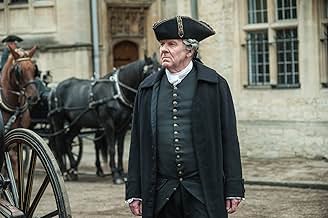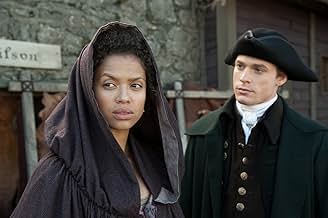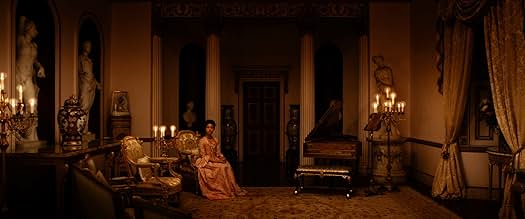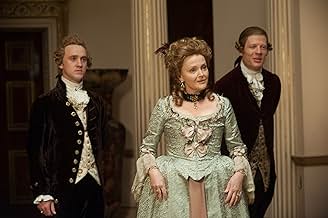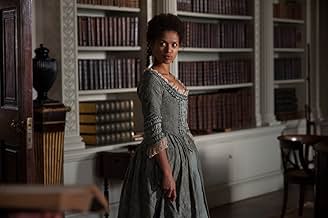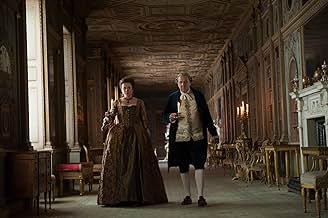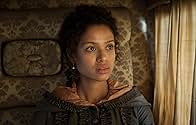PUNTUACIÓN EN IMDb
7,3/10
34 mil
TU PUNTUACIÓN
Sigue la historia de Dido Elizabeth Belle, quien es criada por el aristocrático tío abuelo Lord William Murray, primer conde de Mansfield en la Inglaterra del siglo XVIII. .Sigue la historia de Dido Elizabeth Belle, quien es criada por el aristocrático tío abuelo Lord William Murray, primer conde de Mansfield en la Inglaterra del siglo XVIII. .Sigue la historia de Dido Elizabeth Belle, quien es criada por el aristocrático tío abuelo Lord William Murray, primer conde de Mansfield en la Inglaterra del siglo XVIII. .
- Premios
- 13 premios y 32 nominaciones en total
Reseñas destacadas
In years hence, audiences will be able to point to this film, as the moment the world knew Gugu Mbatha-Raw was going to be big. Belle is Amma Asante's feature-length directorial debut, and her work here is astonishingly confident. Tackling a period piece may seem daunting to most, but in Asante's case, she has the benefit of a top-notch cast, and a truly fascinating story. Loosely based on the story of Dido Elizabeth Belle, Dido was the daughter of an enslaved African woman and an English admiral.
As the film begins, although she is born illegitimate, Dido's father (Matthew Goode, Stoker) gives her over into the care of his great-uncle, William Murray, the first Earl of Mansfield (Tom Wilkinson), who acts as the Lord Chief Justice of the British courts. As she grows into a young woman, Dido's life at the palatial estate of Kenwood is full of mixed blessings. While her uncle and aunt (Emily Watson, Breaking the Waves) treat her as if she were their own—they raise her alongside their other niece, Elizabeth Murray (Sarah Gadon, A Dangerous Method)—social conventions of eighteenth century society are immovable; no matter how much they love her, Dido feels the sting of being forced to eat with the servants, when company comes calling.
The greatness of the film comes in its intricate plotting, and in the parallels drawn between gender and race. Author Jane Austen dealt with the position of women in English society through the use of dry humor—though the rage at a young woman being forced into marriage in order to secure a safe future was always very much present. In Belle however, there is no satire to soften the blow. As Elizabeth comes out, venturing to London in search of a husband, she points out to Belle the inherent unfairness of a system that allows women to be treated as male property. Dido doesn't necessarily have the problem of a search for a husband, as the inheritance of her father's fortune ensures that she is financially secure; but for a radiant young woman in the prime of her life, her uncle's insistence on keeping her out of sight understandably rankles her.
Matters are complicated by the arrival of John Davinier (Sam Reid), the son of a local clergyman. Ambitious and wide-eyed, John wants to try to rise in station, training with Lord Mansfied to become a lawyer. His outspoken, radically abolitionist views on a notorious legal case Lord Mansfield is trying annoy the Lord considerably; but he rouses all the passionate feeling in Dido that she has been forced for so long to suppress.
As Lord Mansfield, Wilkinson (Batman Begins, Michael Clayton) plays the exasperated father figure with the correct touches of humor and warmth. As a judge, he projects the inner conflicts of a man with the weight of the entire economic system on his shoulders; you can see him try to deflect from the strong-arming of local politicians, who want to ensure that the presence of the "mulatto" in his house will not affect his ruling on the case. As Elizabeth, Gadon takes what could have been a very stereotypical role of the flighty, romantic English girl, and brings a deep sense of hurt to it. Having been left with her uncle after her new stepmother successfully wrote her out of her father's will, Elizabeth's cheery exterior hides an emotionally hurt young girl.
And finally, there is Mbatha-Raw. As Dido, the engine that drives the film, you may deeply feel her two-fold frustration as a woman, and as a person of color. You will be carried away by her passion—her belief that things should not remain the same. On a more general level, the camera absolutely adores her. She moves and projects with a vitality and ease that forces one to stop at several points. Her characterization and her performance are so accomplished, that her independent-minded heroine could stand toe-to-toe with the multiple incarnations of Jane Austen's Elizabeth Bennett. If Belle is any indication, and if there is any fairness in this world, there should be more great things to come from her.
-Nick Kostopoulos - See more at: http://www.mediumraretv.org
As the film begins, although she is born illegitimate, Dido's father (Matthew Goode, Stoker) gives her over into the care of his great-uncle, William Murray, the first Earl of Mansfield (Tom Wilkinson), who acts as the Lord Chief Justice of the British courts. As she grows into a young woman, Dido's life at the palatial estate of Kenwood is full of mixed blessings. While her uncle and aunt (Emily Watson, Breaking the Waves) treat her as if she were their own—they raise her alongside their other niece, Elizabeth Murray (Sarah Gadon, A Dangerous Method)—social conventions of eighteenth century society are immovable; no matter how much they love her, Dido feels the sting of being forced to eat with the servants, when company comes calling.
The greatness of the film comes in its intricate plotting, and in the parallels drawn between gender and race. Author Jane Austen dealt with the position of women in English society through the use of dry humor—though the rage at a young woman being forced into marriage in order to secure a safe future was always very much present. In Belle however, there is no satire to soften the blow. As Elizabeth comes out, venturing to London in search of a husband, she points out to Belle the inherent unfairness of a system that allows women to be treated as male property. Dido doesn't necessarily have the problem of a search for a husband, as the inheritance of her father's fortune ensures that she is financially secure; but for a radiant young woman in the prime of her life, her uncle's insistence on keeping her out of sight understandably rankles her.
Matters are complicated by the arrival of John Davinier (Sam Reid), the son of a local clergyman. Ambitious and wide-eyed, John wants to try to rise in station, training with Lord Mansfied to become a lawyer. His outspoken, radically abolitionist views on a notorious legal case Lord Mansfield is trying annoy the Lord considerably; but he rouses all the passionate feeling in Dido that she has been forced for so long to suppress.
As Lord Mansfield, Wilkinson (Batman Begins, Michael Clayton) plays the exasperated father figure with the correct touches of humor and warmth. As a judge, he projects the inner conflicts of a man with the weight of the entire economic system on his shoulders; you can see him try to deflect from the strong-arming of local politicians, who want to ensure that the presence of the "mulatto" in his house will not affect his ruling on the case. As Elizabeth, Gadon takes what could have been a very stereotypical role of the flighty, romantic English girl, and brings a deep sense of hurt to it. Having been left with her uncle after her new stepmother successfully wrote her out of her father's will, Elizabeth's cheery exterior hides an emotionally hurt young girl.
And finally, there is Mbatha-Raw. As Dido, the engine that drives the film, you may deeply feel her two-fold frustration as a woman, and as a person of color. You will be carried away by her passion—her belief that things should not remain the same. On a more general level, the camera absolutely adores her. She moves and projects with a vitality and ease that forces one to stop at several points. Her characterization and her performance are so accomplished, that her independent-minded heroine could stand toe-to-toe with the multiple incarnations of Jane Austen's Elizabeth Bennett. If Belle is any indication, and if there is any fairness in this world, there should be more great things to come from her.
-Nick Kostopoulos - See more at: http://www.mediumraretv.org
I saw this film at the San Francisco International Film Festival. I don't usually see two films in one day and was tired after already seeing another film, but Belle woke me up. I really enjoyed it.
This film would have been OK as a total fiction but given that it was based on a true story, I found it fascinating. Set in England in the late 1700's, it shows the impact of the slave trade on society. The patriarch of the family is a justice of the High Court of England and takes on an important case regarding a slave trading ship while confronting the reality of limitations faced by his mulatto niece. It shows that when someone becomes part of your family, and you love that person, it changes your perspective on cultural norms. This film has prompted me to look into the history of the actual legal case involved.
The film also showed the similarities between his white and mulatto nieces: as women both had a price on their heads and suffered due to their "place" in that society beneath men... This film showed that while much has changed, many attitudes have not changed in 300 years... The two brothers who court the nieces could have come from any current film if they just updated their styles of clothes, hair, and accents.
This film would have been OK as a total fiction but given that it was based on a true story, I found it fascinating. Set in England in the late 1700's, it shows the impact of the slave trade on society. The patriarch of the family is a justice of the High Court of England and takes on an important case regarding a slave trading ship while confronting the reality of limitations faced by his mulatto niece. It shows that when someone becomes part of your family, and you love that person, it changes your perspective on cultural norms. This film has prompted me to look into the history of the actual legal case involved.
The film also showed the similarities between his white and mulatto nieces: as women both had a price on their heads and suffered due to their "place" in that society beneath men... This film showed that while much has changed, many attitudes have not changed in 300 years... The two brothers who court the nieces could have come from any current film if they just updated their styles of clothes, hair, and accents.
I wanted to see this movie because it is a period piece. I did not know that it is based on a true story . I loved the settings, the costumes, the writing and the acting. A well written story of the start of the road to abolishing slavery in England. The Story of DIdo - the caring aunt and uncle who took her under their roof, the other niece who they are raising also and how she develops into a beautiful and very smart lady. I'm sure the reactions by the people at that time were presented accurately. Dido was not allowed to eat with company but could with just the family. The courting of the women when they were of that age was interesting to watch and the conniving by the mother of the two -oh so different men in the name of wanting more money to come from the women. I especially like the intelligence of Dido and how it came out in the age of when women were not to be involved in politics or anything other than the home. A beautifully photographed film.
Initially I was excited to see this movie because of Matthew Goode, even though I realized that he only plays a minor role in this film. After seeing the trailer however, the film flew towards the top of my "to watch" list. It still managed to exceed my expectations - interesting, well paced storyline, incredible cast (Tom Wilkinson was absolutely brilliant), intricate and beautiful costumes - definitely a movie that will be enjoyed even by those who are not big fans of period pieces.
The fact that the movie was based on a true story just made it even more impactful. Dido Elizabeth Belle is left in England by her loving Admiral father, to be raised by her aristocratic aunt and uncle - at a time in history when wealth and social standing could not overshadow the fact that she was a mixed race, illegitimate child. Belle's story of trying to figure out her place in the world and in her family unravels beautifully alongside a closer and deeper look at the racism and sexism plaguing the British society at the time. Add a dash of romance and the result is a beautiful film definitely worth watching.
The fact that the movie was based on a true story just made it even more impactful. Dido Elizabeth Belle is left in England by her loving Admiral father, to be raised by her aristocratic aunt and uncle - at a time in history when wealth and social standing could not overshadow the fact that she was a mixed race, illegitimate child. Belle's story of trying to figure out her place in the world and in her family unravels beautifully alongside a closer and deeper look at the racism and sexism plaguing the British society at the time. Add a dash of romance and the result is a beautiful film definitely worth watching.
I just saw an advance screening of BELLE--and I absolutely loved it. The dialog, directing, performances, costumes, locations, and cinematography were all fabulous.
It's based on the mesmerizing and romantic true story of the beautiful, intelligent, mixed race daughter of an admiral, who was raised in Georgian England by her aristocratic great-uncle and his wife. The script hits all the right notes as Belle struggles to find her place in a society that doesn't quite accept her, and with the help of an idealistic young vicar's son (Sam Reid-- fantastic), influences an important anti-slavery case.
Congratulations to director Amma Asante and writer Misan Sagay for bringing this story vividly to life on the screen. Gugu Mbatha-Raw was luminous as Dido Belle, and I think Tom Wilkinson gave the best role of his career. Both are Oscar-worthy performances. The film is highly recommended.
It's based on the mesmerizing and romantic true story of the beautiful, intelligent, mixed race daughter of an admiral, who was raised in Georgian England by her aristocratic great-uncle and his wife. The script hits all the right notes as Belle struggles to find her place in a society that doesn't quite accept her, and with the help of an idealistic young vicar's son (Sam Reid-- fantastic), influences an important anti-slavery case.
Congratulations to director Amma Asante and writer Misan Sagay for bringing this story vividly to life on the screen. Gugu Mbatha-Raw was luminous as Dido Belle, and I think Tom Wilkinson gave the best role of his career. Both are Oscar-worthy performances. The film is highly recommended.
¿Sabías que...?
- CuriosidadesIn real life, Lady Elizabeth Murray married first to George Finch-Hatton, 10th Earl of Winchilsea. Their great-grandson was Denys Finch Hatton, who was played by Robert Redford in Memorias de África (1985).
- PifiasEngagement rings were not used in the late 1700s. They didn't emerge until the 1920s.
- Citas
Dido Elizabeth Belle: My greatest misfortune would be to marry into a family who would carry me as their shame.
- ConexionesFeatured in Belle: The Story (2014)
- Banda sonoraPiano Suite in G Minor, HWV 439, Allemande
Composed by George Frideric Handel
Selecciones populares
Inicia sesión para calificar y añadir a tu lista para recibir recomendaciones personalizadas
- How long is Belle?Con tecnología de Alexa
Detalles
- Fecha de lanzamiento
- País de origen
- Sitios oficiales
- Idiomas
- Títulos en diferentes países
- Белль
- Localizaciones del rodaje
- Empresas productoras
- Ver más compañías en los créditos en IMDbPro
Taquilla
- Presupuesto
- 10.900.000 US$ (estimación)
- Recaudación en Estados Unidos y Canadá
- 10.726.630 US$
- Fin de semana de estreno en EE. UU. y Canadá
- 106.578 US$
- 4 may 2014
- Recaudación en todo el mundo
- 16.607.575 US$
- Duración1 hora 40 minutos
- Color
- Mezcla de sonido
- Relación de aspecto
- 2.35 : 1
Contribuir a esta página
Sugerir un cambio o añadir el contenido que falta

Principal laguna de datos
By what name was Belle (2013) officially released in India in Hindi?
Responde






